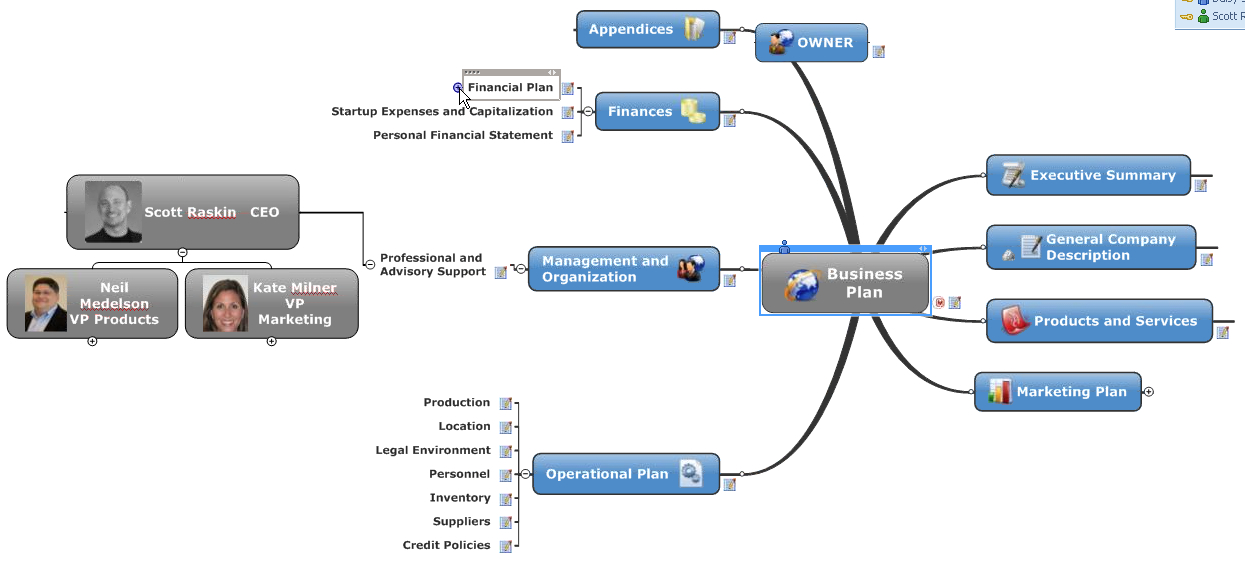Mindjet takes on Cisco with Catalyst

Mindjet has released a new product called Catalyst that hopes to take the notion of the whiteboard into the digital realm but with a lot more bells and whistles. In doing so they are making a direct play against the like of Cisco's WebEx with aggressive pricing and a better collaboration model.
Last evening I spent time discussing the new solution with Scott Raskin, Mindjet's CEO. The stand out comment he made was that while we have all manner of tools labeled as 'collaboration', they are really providing better ways of communicating. "With something like WebEx, you'll find that people are only paying partial attention. Some are doing email, another is playing with a Blackberry. There is no real sense that people are collaborating." I don't entirely agree though I take the point.
Adobe Connect for instance, provides the ability to mix different media including chat that allows the real time exchange of ideas. Collaboration in the Mindjet world is supposed to be about the real time exchange of ideas and knowledge creation that leads to plans, schedules and assignments. It's a fair point.
Scott made a similar argument about social tools though I argue that wiki style offerings from the likes of SocialText or MindTouch allow people who are geographically dispersed to actively participate in collaboratively assembled documents albeit in an asynchronous way. I gave the example of a project where I was working across 12 different time zones. It simply isn't possible to get people altogether in one place in that scenario with any degree of certainty. Where Mindjet makes the most powerful play comes in talking about how we think better in pictures rather than text and how that can be expressed in business processes.
Mindmapping tools has a long history but Mindjet hopes Catalyst will take that familiar concept and propel it into the heart of current collaboration efforts. There is good reason to think they have a shot at this. The demo I saw showed a rich palette of tools that helps participants marry people and web discoverable resources, project management and real time web conferencing in a well integrated palette. The one thing that is conspicuously missing however are alerts either via some sort of IM capability or email. That despite the inclusion of IM chat inside the interface.
That means while personnel with the appropriate privileges can assign tasks and put them onto a project timeline, they have to be manually communicated to the appropriate person if they're not participating at the time ideas are being mapped. That's a reasonable assumption once it comes to getting things done. I suppose those communications could be managed via a dedicated project management tool or email but that seems self defeating.
One surprisingly scary aspect is the notion of searchable web resources. When Mindjet fired up the application, they showed a Google search based on my name with a slew of resources they'd discovered about me. It wasn't entirely accurate but 90% is good enough. The scary part comes in my having forgotten about some of the places I've provided content which goes to show the truth that nothing truly dies on the Internet. As one person said on the call: "We're watching you." That aside, leveraging Google in real time for this purpose makes a huge difference to testing or augmenting ideas in real time.
It's the pricing that stuns. The company is offering Catalyst as a service for $25/user/month with web conferencing moderators costing an additional $25. There's a 30 day free trial and price breaks start at 5 users. That compares favorably with WebEx and GoToMeeting. GoToWebinar (an extension of GoToMeeting) for instance costs $95 per month for a moderator account. It provides the means to share desktops and pass control between participants plus invite many hundreds of participants but that's not the same as having a central point of real time collaboration and sharing. As Scott pointed out, it's really communication.
Mindjet has traditionally been seen as a departmental solution. Based on what I have seen, there is no logical reason why the company could not think in terms of enterprise class sales. One of the scenarios we looked at for instance was the idea of creating a business plan. That necessarily traverses operations, marketing, sales, finance.
The horizontal nature of the application should make it appeal to any large enterprise where there are projects ongoing across multiple departments. Given its visual appeal, that aspect might serve to overcome some of the power based objections Oliver Marks refers to when considering collaborative strategies. Does it pass the 'social' sniff test so many observers choose to apply? I don't know and I don't care. I do think however that Mindjet has tapped into something that is inherently human that people will find enjoyable. That's not something you usually associate with enterprise software but the UX attention to detail has been thoughtful and it shows.
The risk for point tools like Mindjet's original product is that they get subsumed into something greater. In this case, the company has seen the future of project collaboration and created a category for themselves. Caveats around the comms issue aside (which Scott assures me is easy to fix), Catalyst sufficiently distinguishes and has enough depth to carry the company a long way. As you might tell, I really like it, but then the best innovations I see are coming from relatively small players.
I wonder how long it will be before the likes of Cisco knock on Mindjet's door?
